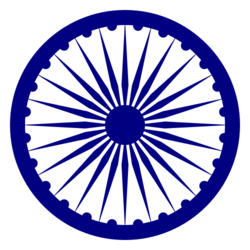Physics:Samay

In Sanskrit, samay (समय) is the "appointed or proper time, [the] right moment for doing anything."[1] In general parlance, samay is a unit of time. The samay chakra is the great chariot wheel of time which turns relentlessly forward.
Meaning
In current usage, samay means "time" in India languages such as Bengali, Hindi, Marathi, Gujarati.
In Jainism
Meaning
Samay represents the most infinitesimal part of time that cannot be divided further. The blink of an eye, or about a quarter of a second, has innumerable samay in it. For all practical purposes a second happens to be the finest measurement of time. Jainism however, recognizes a very small measurement of time known as samay, which is an infinitely small part of a second.
Measurements
The following are measures of time as adopted by Jainism:
- indivisible time = 1 samay
- innumerable samay = 1 avalik
- 16,777,216 avalik = 1 muhurt
- 30 muhurtas = 1 day and night
- 15 days and nights = 1 paksha (fortnight)
- 2 pakshas = 1 month
- 12 months = 1 year
- innumerable years = 1 palyopam
- 10 million million palyopams = 1 sāgaropam
- 10 million million sāgaropams = l utsarpiṇī or 1 avasarpiṇī
- 1 utsarpiṇī + avasarpiṇī = 1 kālchakra (one time cycle)
Example
When an Arihant reaches the stage of moksha (liberation), the soul travels to the Siddhashila (highest realm in universe) in one samay.
In Hinduism
Samay was the basic unit of time in ancient Hindu mythology. Currently, it is used synonymously with time.
Samay in music
Samay is a term used in Indian classical music to loosely categorize ragas into times of day. Each raga has a specific period of the day (prahar) when it is performed.
In Gandharva-Veda the day is divided into three-hour-long intervals: 4–7 a.m., 7–10 a.m., etc. The time concept in Gandharva-Veda is more strictly adhered to than it would be, for example, in Carnatic music.
See also
References
- ↑ Monier-Williams. A Sanskrit-English Dictionary: Etymologically and Philologically Arranged with Special Reference to Cognate Indo-European Languages. Oxford University Press. sv. "samay."[full citation needed]
External links
- "Samay", SpokenSanskrit.org.
